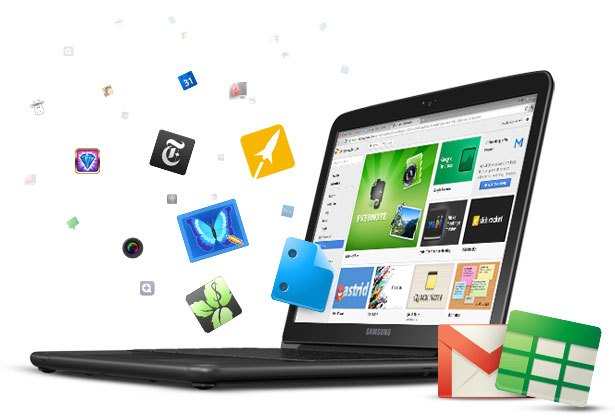Cloud computing is a term that most of you are pretty familiar with. If not check out our take on the Cloud here. Our topic of interest in this article is going to be the Chrome OS, the Operating system powering Google’s own laptop – the Chromebook and the only OS to be almost completely dependent on the cloud. And that’s great right?
That means that the only major requirement of this device is a stable internet connection. Basically what the Chrome OS does is it stores all the data on your PC in the cloud, on Google’s servers, rather than storing all of it in the Chromebook’s hard drive. This, of course, grants you all the nifty features that come with the cloud such as freedom from having to carry around your data on a pen drive or a CD (remember those funny looking discs guys? Yeah, we’re talking about those things.) or automatically updating all copies of a file on multiple devices.
To keep things short I’ll just enumerate a couple of the pros and cons of the Chromebook and the OS in general:
Cons:-
- No internet, no work: As I’ve already mentioned, you need to store your data in the cloud and to do this you need a stable internet connection. If, for some reason you don’t, tough luck buddy.
- It’s browser-based: The main interface of the OS is its browser, Google Chrome. If you’ve used the browser, you’ve used 80% of the Chrome OS.
- Monolithic Design: The Chrome OS is only supported on hardware that’s pre-designed for it.
- Lack of application support: Oft used applications such as Photoshop or most PC Games will not be able to run on the Chromebook.
- Availability of Chrome Apps: There simply aren’t enough Chrome apps yet for the Chrome OS to become viable in the mainstream market.
- Optical Drive: It doesn’t exist.
- Storage Space: Google Chrome is providing 100 GB of free storage on Google Drive for 1st two years but after that period we’ll have to purchase storage from them. (Also 100 GB is way too little in this day and age anyway.)
- Targeted Advertisements: It’s no secret that most advertisement services track your activities online in order to personalize the advertisements you get while on the internet. Having all your data on Google’s servers naturally raises questions as to how private your private data really is.
Pros:-
- Cloud based: Since it is cloud based we can to log in from any internet enabled device and access our own data stored in cloud.
- Affordable: Price matters, and the Chromebook is available within 200-300$ price range, cheaper than almost any other available laptops.
- Open source: Being licensed under an Open Source license, it has the obvious advantages of allowing us geeks to go ham on the innards.
- Battery life and boot time: The Chromebook is blazing fast and is touted to have around 6.5 hours of battery life, though in real life the figure is slightly lower. It owes much of this speed to the 16 GB solid state drive built into the device.
- Secure: The Chrome OS offers heightened security because it’s based on Linux and because none of your data is actually physically present on the device itself.
My Take:
For a single user the Chrome OS does have considerable advantages but what about companies, or large organizations? A cloud based operating system will allow them to collaborate much more efficiently on various projects effectively increasing pace of their progress by several times. At present, however, most organizations are quite happy with using mainstream operating systems. Will the advantages of the Chrome OS be able to lure them away from their comfort zone and justify them bearing the costs of migrating from one Operating System to a new one?
Also note that the mainstream Operating Systems already have their own cloud solutions in place. Apple’s iCloud and Microsoft’s SkyDrive are robust cloud based offerings in their own right and it will be hard for Google to wean users away from such services. In my honest opinion, the future looks pretty bleak for the Chrome OS and the Chromebook.



